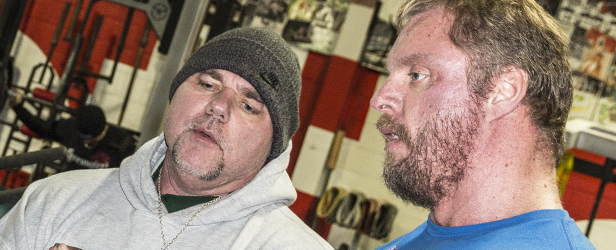
From elitefts™ Q&A
Hi, Dave.
I just watched the T-Bar row drop set video with John Meadows and Ben Pakulski. Looking at the total amount of work you guys did over the whole session made me wonder how to determine whether you've done too much work or not enough. I often find myself holding back on the basis of, "Stimulate, don't annihilate," hoping not to ruin the next session's work by over-taxing my recovery.
How do you know when to push sessions like this so far into the red zone?
How do you know when you've gone too far?
Additionally, how do you fit it into a greater longterm scheme of training rather than "the workout of the day"? [My goals are primarily in bodybuilding.]
- Nick
Controlling Volume
The first two weeks and last two weeks of every phase, the volume is cut back.
I also structure my 12-week phases a bit differently than most of John's clients. I can do this because I have no goal to ever step on stage or lift in a meet again. My goal in training is simply to be able to train my ass off for as long as I can.
Here is how we have modified it...
Phase 1
I spend the first 12-week phase accumulating as much strength as I can. This means my focus on technique is not as tight. I worry more about the movement than the muscle and trying to increase the weight and/or reps each week. Very little is done in terms of intensification (strip sets, force reps, iso tension, yielding, tempo and so on). This is usually when I am gaining weight and eating about 50-60% of what I want. This will be the strongest I will be all year. Also the biggest and fattest.
Phase 2
I transfer to 50/50, so half of my movements focus more on training and contracting the muscles. Some intensification is added. The goal here is to shift from the force of movement into control of movement and contraction. I have found I can't shift gears from one phase to another and need some stagnation and transition time. My diet also becomes 30% of whatever I want and my weight (or bloated weight) starts to come off.
Phase 3
This phase is 80/20 with almost all of the focus on the muscle. Diet becomes strict and bodyfat begins to fall off at a pace of .5% every two weeks. This is when I will be my leanest, recovery is awesome and I feel the best.
Phase 4
The final phase is converting back out of phase 3 with the goal of stabilization in mind. I have yet to master this phase. We "almost" made it 12 weeks last time.
I should note that these are my modifications to John Meadow's Program. I do compensate John for his customized training and I do follow what is written but do change the way I will do the reps, rest periods, sessions per week and other factors to fit the progression listed above. I do this because I love to go balls out year around but need to do so in ways that allow me to do it without destroying myself. I have many preexisting issues and damage and this needs to be accounted for in my training and nutrition.
Looking back, John and I have spent HOURS discussing these modifications and the fact that he is older is a huge asset because he understands where I am coming from and why. He also understands different training schemes. Because of this, we are able to bounce ideas off each other and I do not feel like I am speaking to someone who has no clue what I am talking about. His background is 100% in bodybuilding and mine is all based in maximal strength development. These really are two different worlds.
I am fortunate to train with John once or twice week, so there is constant feedback. At the same time, I try to keep my training closely in line with his so I can better help him get ready for his shows.
One other extremely important note is John LISTENS to what I tell him and provides his feedback and insight on if he think it will work, is experimental or to much of a risk. Just to have someone who listens and provides a different perspective is a huge asset. I have had four of five different coaches over the years and very few of them ever listened to what I thought – let alone worked with me on how to apply it. I have been training for 30 years so I have a pretty good idea of what will not work. Actually, I have a real good idea of what doesn't work for me.








